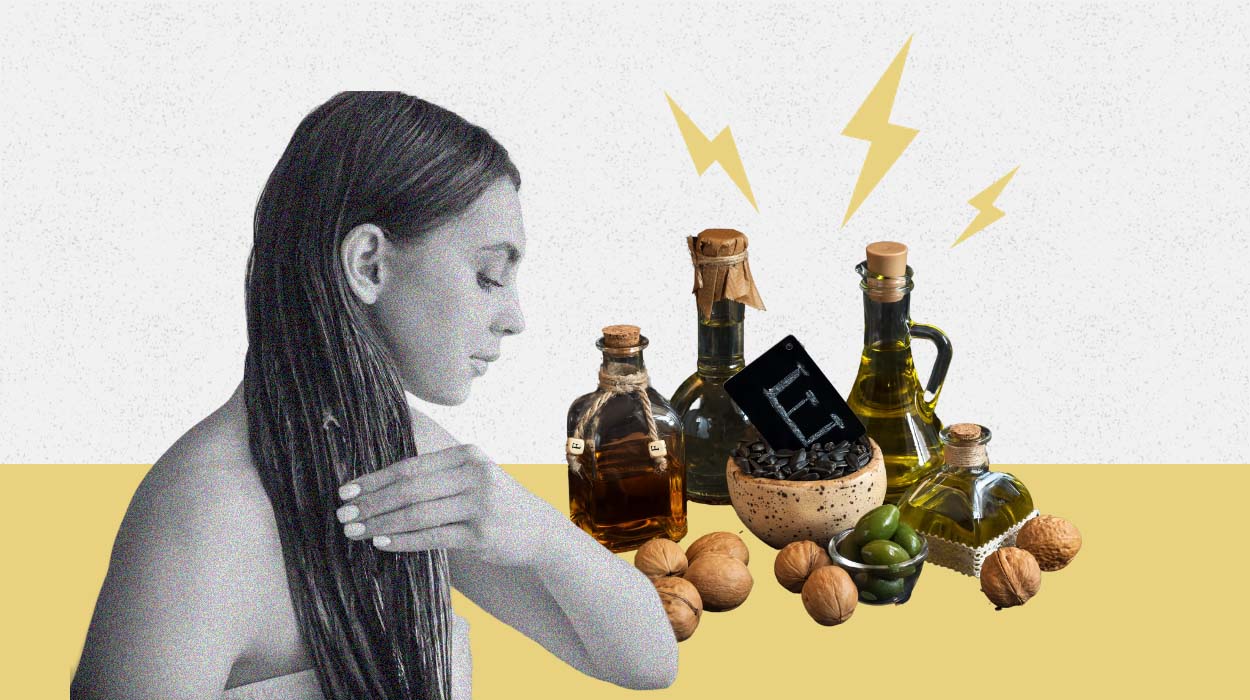 Expert's opinion
Expert's opinion
Expert's opinion
The article is a subjective view on this topic written by writers specializing in medical writing.
It may reflect on a personal journey surrounding struggles with an illness or medical condition, involve product comparisons, diet considerations, or other health-related opinions.
Although the view is entirely that of the writer, it is based on academic experiences and scientific research they have conducted; it is fact-checked by a team of degreed medical experts, and validated by sources attached to the article.
The numbers in parenthesis (1,2,3) will take you to clickable links to related scientific papers.
Is Vitamin E Oil Good For Hair? Benefits, Risks & Uses In 2024

Amidst the millions of hair care products out there, there’s one nutrient that always stands out: vitamin E. While celebrated alongside other hair vitamins, it’s the one that’s most famously used to promise better strength and shine. But can the rumors really be true — is vitamin E good for hair? As a plant-based antioxidant, vitamin E’s curative properties can hydrate and reduce inflammation, improving your scalp and locks. Is vitamin E oil good for hair? Here, we’ll go deeper into the science of vitamin E to determine whether it’s good for your hair and its other potential uses and risks. So, let’s get started.
Can You Put Vitamin E Oil In Your Hair?
Yes, the antioxidant properties of vitamin E are essential for skin and hair health. When applied topically, vitamin E oil has numerous beneficial effects on hair, including:
- Preventing hair loss.
- Stimulating hair growth.
- Promoting a healthy scalp.
- Strengthening hair follicles.
- Combating oxidative stress.
- Increasing blood flow to the hair.
- Smoothing and shining coarse hair.
Is Vitamin E Oil Good For Hair?
Vitamin E oil benefits your skin and general health when used with a healthy diet and regular exercise. Here’s what makes it so famous:
Prevents Hair Loss
Hair loss has been linked to oxidative stress and free radicals, which damage hair follicle cells. Vitamin E’s naturally existing antioxidant capabilities[1] may aid in hair growth by counteracting the negative effects of these elements.
Promotes A Healthy Scalp
Applying vitamin E oil to the scalp is a simple therapy for flaky, dry hair. When applied topically, the oil offers a variety of beneficial effects, including scalp hydration, nourishment, and renewal. Those with dry scalps due to environmental factors, overwashing, or a persistent condition may find this nutrient especially useful.
Strengthens Hair Follicles
Hair follicles degenerate and eventually die due to age. They also become damaged with prolonged chemical treatments and heated styling products. This causes hair to become brittle and prone to split ends. The use of vitamin E oil will strengthen and nourish your hair follicles, making them more durable and less likely to break.
Promotes Hair Growth
While some people are born with thick, long hair, others may struggle to get this look with adequate care and maintenance. This could be due to color fading, continuous exposure to intense heat, or a hair vitamin deficiency. Age also plays a factor, as this is often the onset of thinning hair and hair loss.
Although it may be tough to find an over-the-counter medicine that promotes hair growth, vitamin E oil has some elements that may be beneficial. According to research, taking vitamin E may promote hair growth[2] because it helps the scalp resist oxidative stress.
Fights Oxidative Stress
As an antioxidant, vitamin E oil can reduce the amount of damage caused by free radicals for scalp health. This is significant because oxidative stress impairs the body’s ability[3] to repair damage that can lead to hair follicle cell disintegration and, eventually, hair loss.
Improves Blood Circulation In The Hair
According to research, applying Vitamin E oil to your hair increases circulation to the scalp by relaxing blood vessels. Increased blood flow delivers more oxygen and nutrients to hair follicles, enriching and fortifying hair strands.
Smooths And Shines Coarse Hair
Oil rich in vitamin E has been found to significantly tame unruly, coarse hair. Regularly using vitamin E oil on dry hair will result in a more manageable and smoother hair texture. Vitamin E oil can also improve the hair’s appearance by making it brighter and shinier.
What Is Vitamin E Oil?
Vitamin E is a naturally occurring nutrient that is required by the body. You may get your daily dose of this fat-soluble vitamin by eating the correct foods or taking vitamin E supplements. It protects cells by scavenging free radicals, which are formed when your body breaks down food or when you are exposed to damaging substances such as cigarette smoke, air pollution, or UV light from the sun.
Because of its significance in maintaining a youthful appearance, pure vitamin E oil is called the beauty vitamin. Vitamin E benefits[4] muscles, the skin, and the immune system. Its eight fat-soluble components work as antioxidants to decrease inflammation. This, in turn, aids in maintaining your healthy hair, skin, and physique.
Potential Side Effects & Safety
Vitamin E is generally considered safe for oral consumption when taken in the recommended doses. When taken orally, vitamin E may rarely cause the following side effects:
- Creatinuria.
- Nausea
- Diarrhea.
- Gastrointestinal cramps.
- Fatigue.
- Weakness.
- Headache.
- Blurred vision.
- Rash.
- Dysfunction of the gonads.
- Fatigue.
Hemorrhagic stroke,[5] which is caused by severe bleeding in the brain, and excessive bleeding after a cut or injury are both possible side effects of taking large amounts of vitamin E.
The recommended daily allowance of vitamin E[6] varies with age. Adults should take 15 milligrams daily, on average, with the tolerable upper limit being 1,000 mg.
Taking large amounts of vitamin E can be fatal for those already in poor health.
How To Use Vitamin E Oil For Hair
Wondering how to put vitamin E oil in your hair? To make the most of vitamin E content, use it in the following ways:
Add To Shampoo Or Conditioner
Pure vitamin E oil can be used for washing hair. Spread it evenly through your hair and scalp, wait a few minutes, and then wash your hair as usual with shampoo and conditioner. You can also add a few drops of vitamin E oil to your shampoo and conditioner for the best results.
Use As A Leave-In Treatment
Experts suggest massaging three to five drops of vitamin E oil directly into the scalp after showering. This can be done alone or in conjunction with carrier oils such as olive or coconut oil. Never use essential oils, different from vitamin E oil, without a carrier oil.
This vitamin E concoction will benefit your hair and scalp health as a leave-in treatment. If you do not have any sensitivities or allergies affecting your scalp, you should try this approach.
Use As A Natural Detangler
If you have naturally curly or fine hair, apply a vitamin E oil solution to your scalp and hair before showering. This will help to tame your hair and make styling easier. Because of its high moisture content, vitamin E oil may be useful in detangling natural hair before shampooing and conditioning it. Some people with fine hair may not need to condition their hair further after using this pre-shampoo treatment.
Food Sources And Supplementation
Plant-based oils, nuts, seeds, fruits, and vegetables all contain vitamin E. Consuming these vitamin-E-rich whole foods[7] or dietary supplements can improve your health and nutritional status in several other ways.
The Bottom Line
Vitamin E oil for hair health is overflowingly supported by science. You can improve the condition of your scalp and allow more nutrients to help strengthen your hair growth with regular vitamin E oil treatments.
Don’t have to spend much money on a high-end product to reap the benefits of vitamin E as a hair care ingredient. You can begin immediately by just eating vitamin E-rich foods, like almonds, asparagus, and avocados.
If you have a condition that affects your hair, skin, or scalp, you should consult your doctor before using treatment or taking vitamin E supplements.
+ 7 sources
Health Canal avoids using tertiary references. We have strict sourcing guidelines and rely on peer-reviewed studies, academic researches from medical associations and institutions. To ensure the accuracy of articles in Health Canal, you can read more about the editorial process here
- Jiang, Q. (2014). Natural forms of vitamin E: metabolism, antioxidant, and anti-inflammatory activities and their role in disease prevention and therapy. Free Radical Biology and Medicine, [online] 72, pp.76–90. doi:https://doi.org/10.1016/j.freeradbiomed.2014.03.035.
- Pérez‐Rodríguez, L., Redondo, T., Rocío Ruiz-Mata, Camacho, C., Moreno‐Rueda, G. and Potti, J. (2019). Vitamin E Supplementation—But Not Induced Oxidative Stress—Influences Telomere Dynamics During Early Development in Wild Passerines. Frontiers in Ecology and Evolution, [online] 7. doi:https://doi.org/10.3389/fevo.2019.00173.
- Trüeb, R.M., Henry, J.P., Davis, M.G. and Schwartz, J.R. (2018). Scalp condition impacts hair growth and retention via oxidative stress. International Journal of Trichology, [online] 10(6), pp.262–262. doi:https://doi.org/10.4103/ijt.ijt_57_18.
- Lewis, E.D., Simin Nikbin Meydani and Wu, D. (2018). Regulatory role of vitamin E in the immune system and inflammation. IUBMB Life, [online] 71(4), pp.487–494. doi:https://doi.org/10.1002/iub.1976.
- Malinee Neelamegam, Looi, I., Kee Sing Ng and Sharad Malavade (2017). Vitamin E supplementation for preventing recurrent stroke and other vascular events in patients with stroke or transient ischaemic attack. The Cochrane library. [online] doi:https://doi.org/10.1002/14651858.cd010797.pub2.
- Nih.gov. (2020). Office of Dietary Supplements – Vitamin E. [online] Available at: https://ods.od.nih.gov/factsheets/VitaminE-HealthProfessional/
- Nih.gov. (2021). Office of Dietary Supplements – Vitamin E. [online] Available at: https://ods.od.nih.gov/factsheets/VitaminE-Consumer/#:~:text=Vegetable%20oils%20like%20wheat%20germ,best%20sources%20of%20vitamin%20E.



